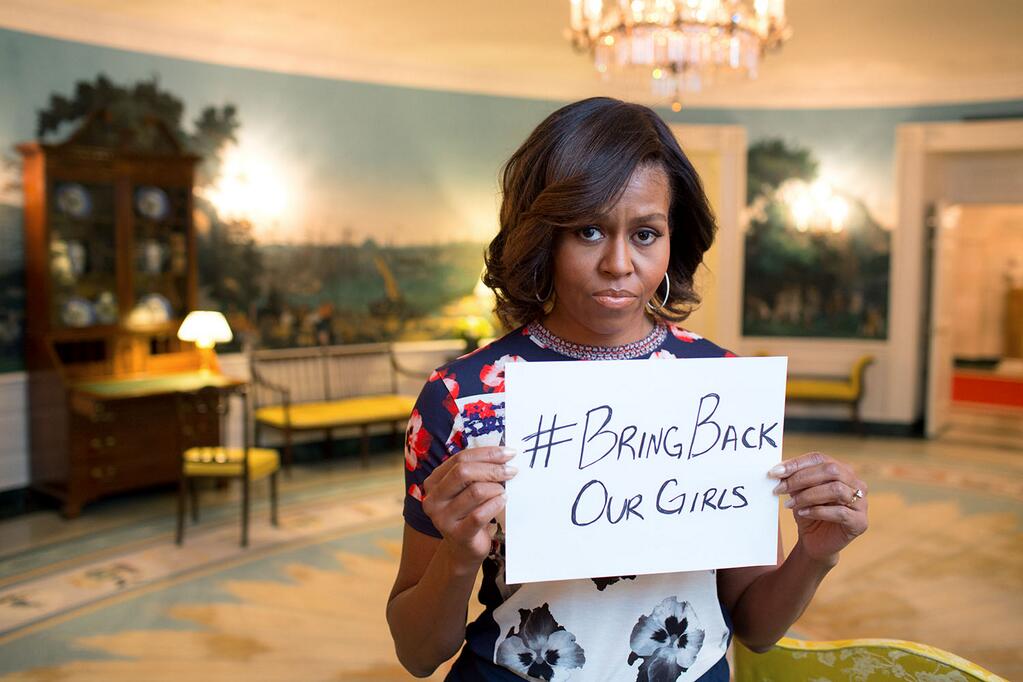In a pointed critique following Donald Trump’s high-profile appearance on Joe Rogan’s podcast, former First Lady Michelle Obama has accused the former president of sidestepping tough interviews. Just a day after Trump’s three-hour sit-down with Rogan, Obama emphasized that Trump “ducks real interviews” and contrasted his media approach with that of Vice President Kamala Harris. Obama suggested that Harris embraces difficult media engagements, unlike her Republican counterpart.
“Kamala is out there, doing the work, answering tough questions, and showing up for real conversations,” Obama said in a statement to supporters, taking a dig at Trump’s approach to public engagement. “We’re seeing a candidate who picks his moments carefully, avoiding any forum where his views would face real challenges,” she added.
Trump’s recent appearance on Rogan’s show attracted millions of viewers, sparking widespread discussion as he tackled various issues in an unscripted, free-form style characteristic of Rogan’s podcast. Trump supporters heralded his willingness to appear on a platform known for long, unfiltered conversations, viewing the appearance as a candid opportunity for him to connect with voters. However, Obama’s comments argue that Rogan’s podcast is not the kind of rigorous media engagement that would test a candidate’s views or policy positions thoroughly.
For Obama, the conversation on who “shows up” for the public is more than a matter of preference—it speaks to the heart of accountability in a presidential campaign. “Trump might talk for hours, but where are the moments of tough questioning and challenging follow-ups?” Obama posed in her remarks. In her view, Trump’s appearance on the podcast lacks the accountability that more traditional, challenging interviews with seasoned journalists would provide.
Kamala Harris, known for her candid media engagements, has been a focal point of the Democratic campaign’s strategy to engage voters through traditional media outlets. Sources close to Harris claim she remains ready and willing to answer direct questions, often participating in press conferences and televised interviews where her policies and record face scrutiny. A Democratic campaign staffer commented, “Kamala isn’t hiding. She knows the stakes, and she faces questions head-on. That’s the leadership we’re bringing.”
Critics of Trump, including Obama, suggest that avoiding such settings represents a strategic sidestep from answering tough questions about policy. Political strategist and commentator Amanda Franklin stated, “It’s easy to appear on a podcast and control the narrative, but traditional interviews demand specifics and expose weaknesses. That’s where candidates prove they’re ready for office.”
The Rogan appearance, while celebrated by Trump’s base, did not escape criticism, with some arguing that the format lacked journalistic rigor. Yet, Trump’s camp dismissed Obama’s critique as unwarranted, pointing to Trump’s track record of connecting directly with audiences on alternative platforms. “Trump speaks to Americans where they are. He’s not afraid to go where traditional politicians won’t,” said a spokesperson for Trump’s campaign.
As campaign season heats up, the contrasting media strategies of Harris and Trump will likely continue to fuel debate over how leaders should engage with the public. For Obama, the issue underscores a broader narrative of transparency and readiness to address tough questions. However, Trump’s team contends that reaching audiences directly offers authenticity that traditional media cannot provide.
Whether Obama’s critique will impact Trump’s strategy remains to be seen, but the former first lady’s comments spotlight a debate about political accountability in the digital age.



 Netanyahu Suggests Iran’s Supreme Leader Khamenei May Have Been Killed in Israeli-U.S. Strikes
Netanyahu Suggests Iran’s Supreme Leader Khamenei May Have Been Killed in Israeli-U.S. Strikes  Does international law still matter? The strike on the girls’ school in Iran shows why we need it
Does international law still matter? The strike on the girls’ school in Iran shows why we need it  Iran Supreme Leader Ayatollah Ali Khamenei Killed in Israeli, U.S. Strikes: Reuters
Iran Supreme Leader Ayatollah Ali Khamenei Killed in Israeli, U.S. Strikes: Reuters  UK Accepts U.S. Request to Use British Bases for Defensive Strikes on Iranian Missiles
UK Accepts U.S. Request to Use British Bases for Defensive Strikes on Iranian Missiles  Trump Launches Operation Epic Fury: U.S. Strikes on Iran Mark High-Risk Shift in Middle East
Trump Launches Operation Epic Fury: U.S. Strikes on Iran Mark High-Risk Shift in Middle East  Suspected Drone Strike Hits RAF Akrotiri Base in Cyprus, Causing Limited Damage
Suspected Drone Strike Hits RAF Akrotiri Base in Cyprus, Causing Limited Damage  Macron Urges Emergency UN Security Council Meeting as US-Israel Strikes on Iran Escalate Middle East Tensions
Macron Urges Emergency UN Security Council Meeting as US-Israel Strikes on Iran Escalate Middle East Tensions  EU Urges Maximum Restraint in Iran Conflict Amid Fears of Regional Escalation and Oil Supply Disruption
EU Urges Maximum Restraint in Iran Conflict Amid Fears of Regional Escalation and Oil Supply Disruption  Israel Launches Fresh Strikes on Iran After Death of Supreme Leader Ayatollah Khamenei
Israel Launches Fresh Strikes on Iran After Death of Supreme Leader Ayatollah Khamenei  Trump Says U.S. Attacks on Iran Will Continue, Warns of More American Casualties
Trump Says U.S. Attacks on Iran Will Continue, Warns of More American Casualties  Trump Warns Iran as Gulf Conflict Disrupts Oil Markets and Global Trade
Trump Warns Iran as Gulf Conflict Disrupts Oil Markets and Global Trade  Israel Declares State of Emergency as Iran Launches Missile Attacks
Israel Declares State of Emergency as Iran Launches Missile Attacks  Argentina Tax Reform 2026: President Javier Milei Pushes Lower Taxes and Structural Changes
Argentina Tax Reform 2026: President Javier Milei Pushes Lower Taxes and Structural Changes  Israel Strikes Hezbollah Targets in Lebanon After Missile and Drone Attacks
Israel Strikes Hezbollah Targets in Lebanon After Missile and Drone Attacks  Russia Signals Openness to U.S. Security Guarantees for Ukraine at Geneva Peace Talks
Russia Signals Openness to U.S. Security Guarantees for Ukraine at Geneva Peace Talks  Marco Rubio to Brief Congress After U.S.-Israeli Strikes on Iran
Marco Rubio to Brief Congress After U.S.-Israeli Strikes on Iran  Pentagon Leaders Monitor U.S. Iran Operation from Mar-a-Lago
Pentagon Leaders Monitor U.S. Iran Operation from Mar-a-Lago 































